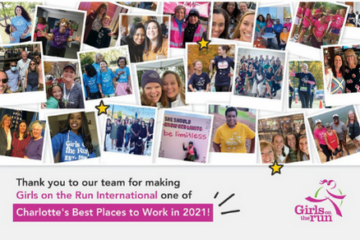BIPOC Mental Health Awareness Month: Marc’s Experience
In recognition of BIPOC Mental Health Awareness Month, GOTR HQ Business System Analyst Manager, Marc Williams, shared some of his own experiences, recommendations and perspectives on the critical subject.
Keep reading to learn more about the significance of this holiday, it’s long-term impact and how Marc is helping to educate his family — and everyone around him — on the importance of mental health.
Introduce yourself!
Originally from Greensboro, NC now living in Charlotte, NC, I am an NC A&T Alumni, husband, and father to an amazing son and daughter. Coming from a family of nine, family is important to me. I work at Girls on the Run International as a Business System Analyst Manager and inspire to have a positive change in the world. I love listening to music, anything computer or internet related, and watching college basketball.
July is BIPOC Mental Health Awareness Month. What does this month mean to you?
As a Black American, an under-represented and marginalized group, it is important to recognize my community and the issues that impact it.
Why is BIPOC Mental Health Awareness Month an important time? What do you hope people will take away from this month?
BIPOC Mental Health Awareness month is an important time because it brings visibility and attention to a subject that can be difficult to talk about especially in the Black American population because of the avoidance our community has often had towards mental health and awareness. As a community, I hope that Black Americans can learn to accept and be open to issues of mental health, which may be even more important in our community than in other groups because of the additional stressors that we face as a result of our past mistreatment as slaves and decades of systematic racism. Therefore, it is of the utmost importance that we take time to bring awareness to this often-stigmatized subject of mental health.
What specific mental health activities/tactics/practices do you employ on a regular basis?
I use many techniques to keep mentally and emotionally healthy such as getting outside for a walk, practicing yoga, having relationships outside of just my family like with friends and coworkers, and clearing my mind through meditation or relaxing with a fictional audiobook or podcast.
How do you teach the importance of mental health to your family?
My son is still just a baby but with my partner and 10-year-old daughter, I stress the importance of having hobbies, always staying positive, and not stressing out about things outside of your control. My daughter and I often read books about mental health, and I am open and honest with my own mental health issues to build the trust and confidence that they can always be open and honest with me.
How do you lead by example as a mental health proponent in the BIPOC community?
I lead my community in focusing on the importance of mental health by talking openly about it with my family and friends and seeing a therapist when things feel overwhelming or even when things are good. I also encourage others to be open with those they trust and to seek professional help.
How does mental health awareness enrich your daily life?
Mental health awareness is beneficial for me because it helps as I navigate each day, keeping a pulse on how I am feeling and why I am feeling that way. Being aware of something is the first step to being able to do something about it so when I know I am stressed or blue I am able to practice techniques like breathing and focusing on the good to help me overcome the mentally and emotionally tough times.
To learn more about BIPOC Mental Health Awareness Month, click here.
To get involved at Girls on the Run, find a council near you!



